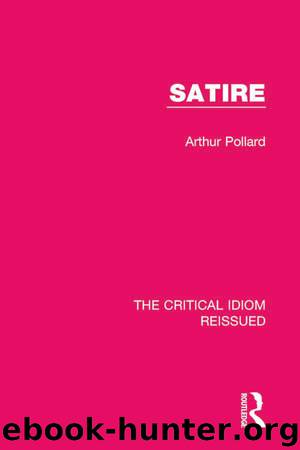Satire by Pollard Arthur;

Author:Pollard, Arthur;
Language: eng
Format: epub
Publisher: Routledge
Published: 2017-06-07T00:00:00+00:00
LOW AND HIGH BURLESQUE
Satire often uses epic, though not usually in so straight a parallel as this. As the most elevated of literary forms epic offers ample scope for the distortions of satire, either by direct deflation or by oblique mock-exaltation. Both of these modes are forms of burlesque, the first, low burlesque in which, as Boileau put it, ‘Dido and Aeneas are made to speak like fishwives and ruffians’, the second, high burlesque or mock-epic in which, conceivably, fishwives and ruffians would speak (and act) like Dido and Aeneas. Butler’s Hudibras is a good example of low burlesque, though of a special kind. He describes the ridiculous adventures of a Puritan knight, not in the lofty idiom suitable to knightly deeds, but in jingling verse and colloquial language. Whereas Don Quixote is a burlesque of chivalric romance, Hudibras goes a stage further and vulgarizes the mode. Thus of the hero we read:
Chief of domestic knights and errant
Either for chartel or for warrant;
Great on the bench, great in the saddle,
That could as well bind o’er as swaddle.
Mighty he was at both of these,
And styled of War, as well as Peace
(So some rats of amphibious nature,
Are either for the land or water):
But here our authors make a doubt
Whether he was more wise or stout:
Some hold the one, and some the other;
But, howsoe’er they make a pother,
The diff’rence was so small, his brain
Outweighed his rage but half a grain;
Which made some take him for a tool
That knaves do work with, called a Fool.
(Part I, Canto I. 21–36)
Butler has no generosity and the mode he uses suits his temper. It is ideal for despising, and Butler is all scorn.
High burlesque, or mock-epic, can also be scornful, but it allows for other tones than this. Dryden in MacFlecknoe takes an epic event, a coronation, as his subject and he describes it in appropriately elevated language. The poem begins on the note of moralistic satire:
All human things are subject to decay,
And when fate summons, monarchs must obey.
There are lines that in isolation might come from epic itself:
At his right hand our young Ascanius sate,
Rome’s other hope and pillar of the state.
(108–9)
There is only the hint of familiarity in ‘our’ to disturb the suitability of this couplet as pure epic. The opening scene shows Flecknoe:
This aged prince, now flourishing in peace,
And blessed with issue of a large increase;
Worn out with business, did at length debate
To settle the succession of the state.
(7–10)
Did we not know by a single (and so far unelaborated) reference that this ‘aged prince’ was Flecknoe, king of the dunces, this would be acceptable as an elevated statement – except perhaps for ‘worn out with business’. My point is that Dryden subtly uses the tone of epic with but slight adulteration to achieve many of his effects. With this, however, he mingles elements of downright deflation. Sometimes it is the effect of a final word or phrase as when Flecknoe,
who, like Augustus, young
Was called to empire, and had governed long;
In prose and verse, was owned, without dispute,
Through all the realms of Nonsense, absolute.
Download
This site does not store any files on its server. We only index and link to content provided by other sites. Please contact the content providers to delete copyright contents if any and email us, we'll remove relevant links or contents immediately.
Still Foolin’ ’Em by Billy Crystal(36041)
Spell It Out by David Crystal(35846)
The Great Music City by Andrea Baker(30780)
Professional Troublemaker by Luvvie Ajayi Jones(29419)
Trainspotting by Irvine Welsh(21021)
Call Me by Your Name by André Aciman(19902)
We're Going to Need More Wine by Gabrielle Union(18631)
The Secret History by Donna Tartt(18159)
Cat's cradle by Kurt Vonnegut(14758)
Ready Player One by Cline Ernest(13981)
Molly's Game by Molly Bloom(13885)
Bombshells: Glamour Girls of a Lifetime by Sullivan Steve(13683)
The Goal (Off-Campus #4) by Elle Kennedy(13193)
Leonardo da Vinci by Walter Isaacson(12801)
The Social Justice Warrior Handbook by Lisa De Pasquale(11951)
4 3 2 1: A Novel by Paul Auster(11788)
The Break by Marian Keyes(9075)
Crazy Rich Asians by Kevin Kwan(8886)
Adultolescence by Gabbie Hanna(8585)
